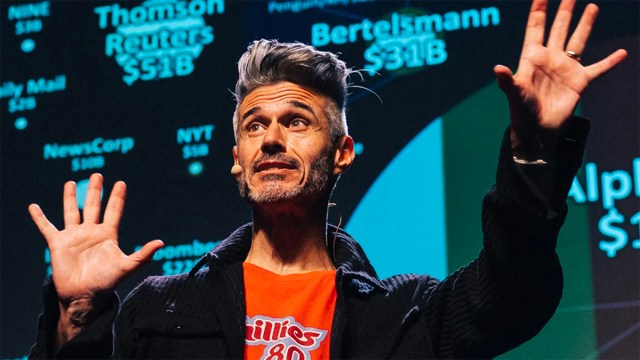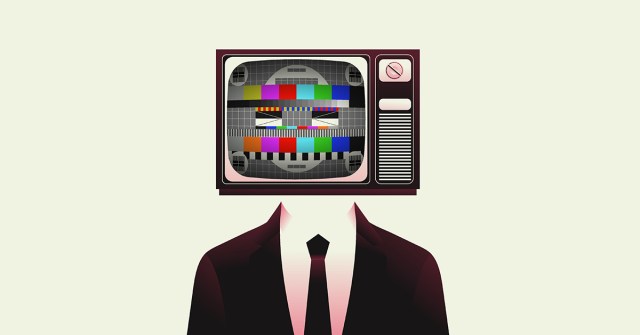TL;DR
- In “Evan Shapiro Amplified: Rebuilding the Industry,” media’s official Unofficial Cartographer declares that “disruption is now the operating system” of the Media & Entertainment industry.
- Shapiro points to the decline of traditional “triple-play” bundles providing broadband, phone and video as one of the root causes of our so-called “media apocalypse.”
- Incremental changes won’t suffice, he says. Shapiro calls for a seismic shift in business models and strategies, urging the industry to move “out of the burning house” and into new structures.
- Expect a surge in M&A activity and a broader focus that includes emerging platforms like video games, which Shapiro describes as the “new form of social media.”
- The power now lies increasingly with the consumer. Shapiro advises leaning into consumer wants and desires as the key to navigating the media apocalypse.
Ready to rebuild the Media & Entertainment industry? Evan Shapiro thinks it’s about time.
In the newest episode of Evan Shapiro Amplified, Media’s official Unofficial Cartographer takes us on a whirlwind tour of the current media apocalypse, as he calls it. Watch the full video above.
From the crumbling edifices of traditional business models to the burgeoning skyscrapers of consumer-centric approaches, Shapiro lays down the blueprint for the industry’s future.
“Change is now a constant, it’s second by second. Disruption is now the operating system of our ecosystem,” he declares.
But what does this mean for an industry that has been in a state of constant flux since its very inception? “Disruption has caught up to the maturation rate of the business models in traditional media. And meanwhile, big tech has gotten bigger and more powerful,” he warns.
This isn’t just a phase; it’s the new normal. And it’s not just about keeping up; it’s about staying ahead.
Plotting a new course for industry, Shapiro emphasizes the urgent need for transformation and adaptability, challenging us to rethink old paradigms and embrace new opportunities. Buckle up, because we’re not just navigating change, he says, we’re steering it.
Disruption as the New Norm
Across M&E, the winds of change aren’t just blowing — they’re gusting. “Business models are being reinvented in real time,” says Shapiro, pointing to COVID as the primary driver of accelerated content consumption.
There are a litany of disruptions that serve as case studies for the industry’s transformation, and Shapiro nods to Disney as a prime example: “During COVID, because of all this new usage… Disney caught up and surpassed Netflix in total number of global subscribers in less than three years,” he says. “And then 90 days later, they fired their CEO. That’s how quickly the whole concept of media changed during lockdown.”
He also cites the decline of traditional triple-play bundles, now being replaced by comprehensive platforms like Amazon Prime. Within sports broadcasting, Shapiro remarks on YouTube’s acquisition of NFL Sunday Ticket and Apple’s deal with Messi for Major League Soccer. Spotify’s struggle to make its low churn rate profitable is another key point on his radar, underscoring the new economic realities of the music industry. These aren’t mere anomalies; they’re harbingers of an industry-wide shift where diversified revenue streams are the new norm.
Shapiro is unequivocal: the old ways won’t cut it anymore. This isn’t a mere adjustment; it’s a seismic shift demanding a radical reinvention of business models and strategies. The media cartographer’s insights are a clarion call for the industry. The traditional power structures are being upended, and new players are entering the field. This isn’t the time for incremental adjustments; it’s a time for radical reinvention of how the M&E industry operates.
So, what’s the way forward? According to Shapiro, it’s about using disruption to fuel innovation and transformation. It’s about recognizing that the old rules no longer apply and that clinging to outdated models is a recipe for obsolescence. In essence, the winds of change are a harbinger of opportunity, not just a storm to weather. And as Shapiro makes abundantly clear, those who adapt will not only survive but thrive in this new norm.
The Road Ahead: Adaptation, Innovation & Diversification
“It’s not enough to try to put curtains on the house that’s burning down, we have to think finally, about moving out of the house and into a new structure,” Shapiro insists. Incremental changes, he observes, are what led the industry into its current predicament.
Shapiro advocates for businesses to adopt a consumer-centric approach. “How do you survive the media apocalypse?” he asks. “The answer is to lean into your consumers wants and desires.”
The media industry, he says, has spent the last 25-30 years ceding more and more power to consumers “every single day, every single month, every single year. And now the leaders of our industry are confused that consumers have so much power.”
Companies that offer a range of “must-have” services will be the ones to thrive, says Shapiro. “One of the things I think most people fail to realize about the current media apocalypse is it wasn’t due to the unbundling of cable TV. That is not the problem,” he explains. The real problem, he says, is the unbundling of what he calls the “triple-play” of broadband, phone and video as a single bundle. “The more hooks you get into the consumer’s home the less likely they are to break up with you because it’s more difficult.”
Shapiro predicts a surge in merger and acquisition activity in the coming years as companies position themselves as providers of consumer must-haves.
The industry, he says, needs to look beyond traditional forms of media. Video game platforms are one area ripe for exploitation. “This is not just a place where people play games, it’s also the new form of social media, people are going there and playing games and then hanging out and talking with friends,” he observes.
In this rapidly evolving landscape, Shapiro’s advice is clear: adapt or be left behind. “We are going to have to stop doing things because we’ve always done them, we’re going to have to do new things that have never been done before.”




